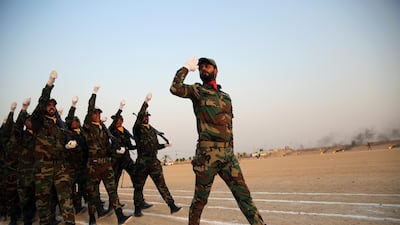All Iraqi paramilitary groups will have to shut down their offices in the country after a directive was issued by the head of their umbrella organisation, the Popular Mobilisation Forces.
The measure is one of several the group's chief, Faleh Al Fayadh, ordered the paramilitaries to take in a letter issued late on Wednesday.
The PMF, made up mainly of Iraqi Shiite paramilitaries backed and trained by Iran, has a total of about 100,000 men.
Also known as the Hashed Al Shaabi, they were mobilised to help Iraqi government forces fight ISIS and were later made an official component of the state security forces.
"On the basis of the Hashed Al Shaabi legislation established in 2016 and the directives of the Prime Minister’s office, we are confirming their legal status and the actions and work of the Hashed in the next coming phase," Mr Al Fayadh wrote.
“The decree issues the closure of all Hashed's offices around the country, the merging of tribal Sunni leaders into the group and the dismantling of any political and religious affiliation to the militias."
Mr Al Fayadh also announced a "ban of all non-military actions that lie outside the Hashed's objectives, especially as the Hashed is considered to be an official entity of the state's security apparatus".
The Iraqi paramilitaries built up by Tehran have grown to wield great influence in Iraqi politics and the economy, much like the Iran-backed Hezbollah group in Lebanon.
Mr Al Fayadh's orders came as the head of Iran’s Quds Force, the foreign operations arms of its Revolutionary Guard, was in Baghdad for an official visit.
Ismail Qaani entered the country after applying for a visa, unlike his predecessor Qassem Suleimani, who was killed in a US drone attack in Baghdad alongside Iraqi paramilitary leader Abu Mahdi Al Muhandis.
Their deaths brought Iraq and the wider region to the brink of war between Iran and the US.
Suleimani travelled freely to Iraq and other areas of the Middle East where Iran-backed forces operate.
A former Iraqi MP, Hassan Al Mulla, thanked Mr Qaani for entering Iraq with an official visa.
“This shows respect towards Iraq's sovereignty,” Mr Al Mulla wrote on Twitter.
Ala Mustafa, a professor of international relations at Baghdad University, said the move was directed by Prime Minister Mustafa Al Kadhimi’s government and would help to establish respect for the Iraqi state.
Iraq has been caught in the middle of growing hostility between Iran and the US, its two biggest supporters after the US-led invasion in 2003 toppled Saddam Hussein and brought Iraq’s Shiite majority to power.


